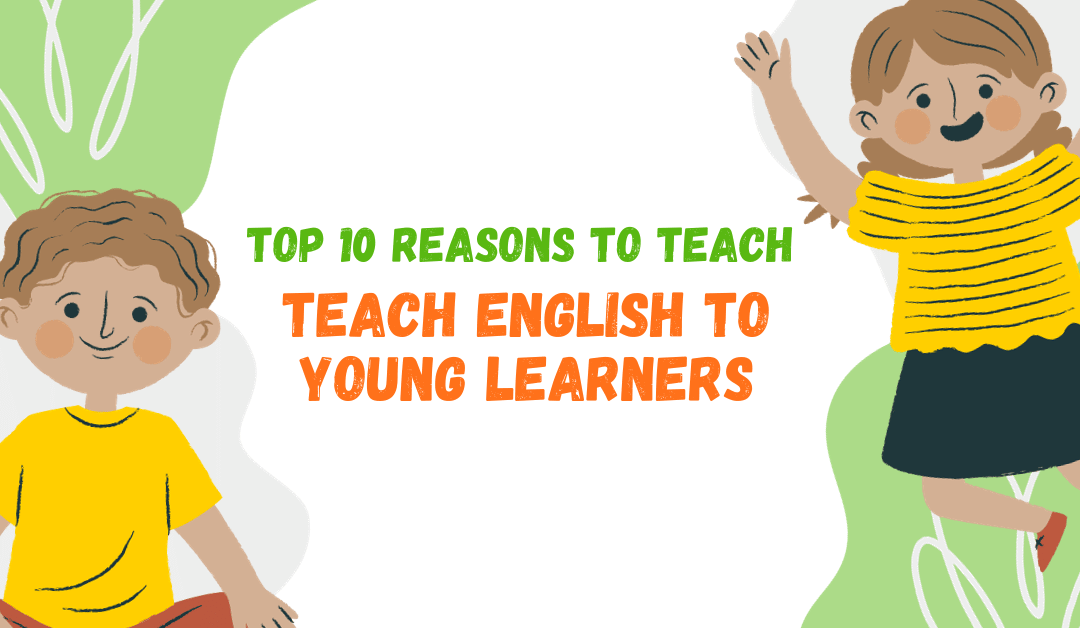
by admin | Aug 26, 2022 | Uncategorized
English language learning is now more popular than ever, and teaching English to young learners can be a great way to make a positive impact in their lives. Not only does teaching English help young minds develop, but it also gives them the opportunity to interact with diverse cultures around the world. Here are some of the top 10 reasons why teaching English to young learners is a rewarding experience.
- Developing language skills: Learning English at an early age helps young learners improve their language skills and develop better communication abilities when they grow up. It also gives them the opportunity to understand cultures from different parts of the world, as well as gain confidence in speaking and writing in English.
- Cultural exchange: Teaching English to young learners gives them the opportunity to understand different cultures and make friends from around the world. It also encourages cultural exchange, allowing students to learn about new ideas and perspectives from other countries.
- Developing critical thinking: By introducing English language learning at an early age, young learners can gain valuable skills in critical thinking and problem-solving.
- Preparing for future jobs: Learning English can give young learners a competitive edge in the job market, as it is one of the most widely spoken and used languages in the world.
- Improving academic performance: Teaching English to young learners helps them perform better academically, as it improves their reading comprehension and increases their ability to understand and use complex language.
- Enhancing creativity: By introducing English language learning at an early age, young learners can expand their creative thinking skills and express themselves more effectively.
- Developing self-confidence: Learning English helps young learners gain the confidence they need to interact with people from different cultures and backgrounds.
- Learning discipline: As English is one of the most sought after languages in the world, teaching it requires dedication and discipline – two qualities which young learners can benefit from learning early on.
- Making a positive impact: Teaching English to young learners is a great way to make a positive impact in their lives. Not only will they benefit from the language, but you can also help shape their future and give them the opportunity to explore new cultures and ideas.
- Being part of something bigger: Teaching English is so much more than just a job – it’s an opportunity to be a part of something bigger and make a difference in the lives of young learners.
With all these great reasons to teach English to young learners, there’s no doubt that it’s an incredibly rewarding experience. Not only will you be making a positive impact on their future, but you’ll also get the chance to build meaningful relationships with your students.
You can help your children or students learn basic language structure through nursery rhymes like verbs, nouns, and adjectives. You can find plenty of unique and uplifting educational songs on Club Baby’s website. So, why not get started and make a difference today?
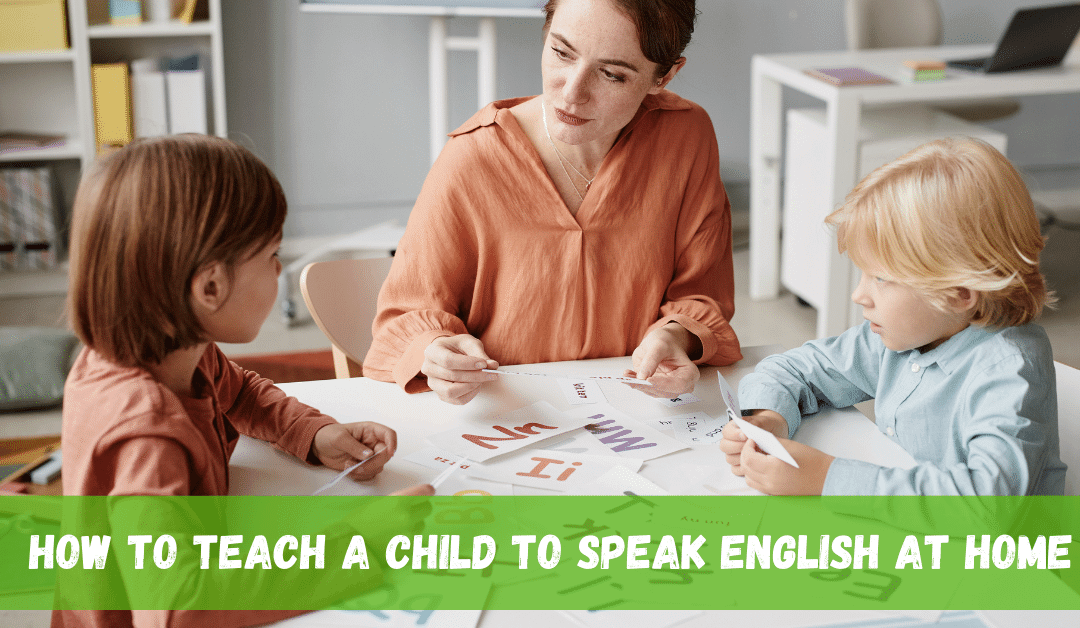
by admin | Jul 26, 2022 | Uncategorized
Learning a new language can be daunting for both children and parents alike, but teaching your child to speak English at home is an important part of their development. Whether you are a native speaker or not, you can use simple methods to help your little one pick up the language quickly and easily. From nursery rhymes to flashcards, there are plenty of ways to keep them engaged while they learn. By providing encouragement and support throughout the process, you will set your child up for success in mastering English as well as other languages later on in life.
Read on for some tips on how to teach a child to speak English at home!
Teaching English at Home
Flashcards
A great tool for teaching English at home is flashcards. Whether you choose physical cards or online versions, they are an excellent way to practice everyday vocabulary. You can make your own flashcards with easy-to-find items like index cards, or purchase pre-made ones online. Flashcards are perfect for practicing colors, numbers, animals and more — all while having some fun!
Positive Reinforcement
Above all, the most important thing you can do to teach English at home is provide positive reinforcement. Provide your child with lots of praise for their efforts and encourage them to keep learning. Even if they make mistakes, remind them that it’s okay and part of the process. You can also reward their progress as an incentive to keep going.
Games and Activities
In addition to Nursery Rhymes and Flashcards, there are plenty of fun games and activities you can do at home to help your child learn English. Brainstorming creative ways to practice grammar and vocabulary is an enjoyable way for both of you to get involved in the process. You can also challenge them with crossword puzzles, word searches, hangman and other language-based games.
Nursery Rhymes
One of the most effective ways to teach a child English at home is through Nursery Rhymes. Nursery rhymes are filled with fun words, simple phrasing and catchy melodies that children can easily memorize. Repetition is key when it comes to language learning and this helps them remember what they heard. You can also take turns singing verses while pointing out the words, pairing them with visuals and having fun with hand motions. Nursery rhymes are also a great way to help children learn basic language structure like verbs, nouns and adjectives. You can find plenty of unique and uplifting educational songs on Club Baby’s website.
Teaching your child English at home doesn’t have to be stressful or intimidating. With plenty of resources at your disposal, you can help them master English in no time. Nursery rhymes, flashcards, positive reinforcement and games are all great methods to get started on the right foot!
By following these tips, you can give your child the confidence they need to become a fluent speaker of the English language.
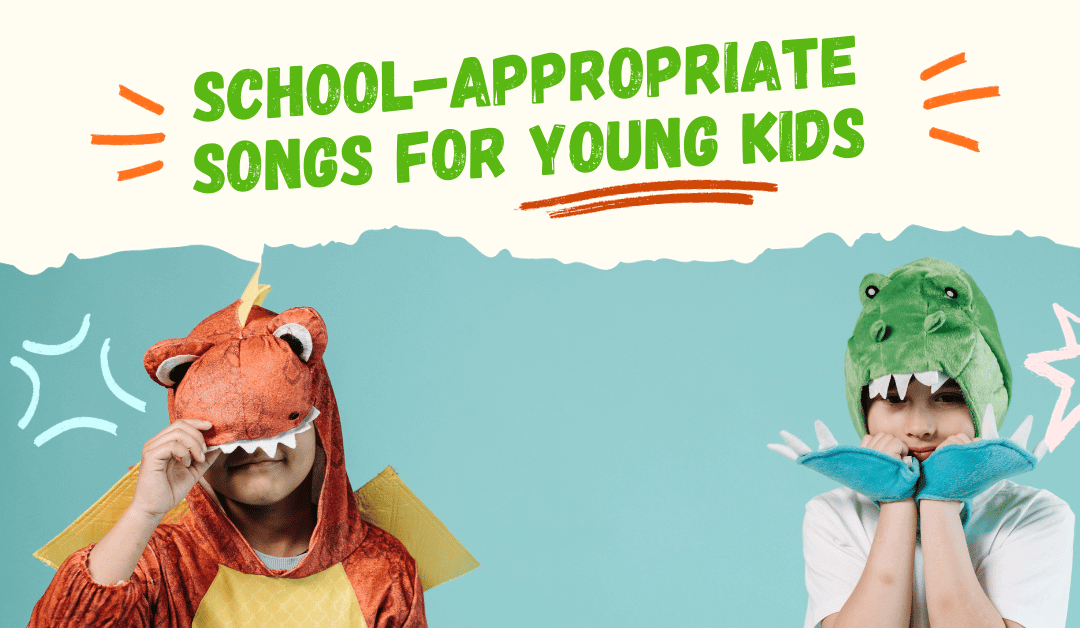
by admin | Jun 26, 2022 | Uncategorized
Music is an important part of every child’s life, and it can help them learn, express themselves, and even just have fun. But when kids are young, it’s important to be mindful of the type of music they listen to. That’s why many parents look for school-appropriate songs that their children can enjoy without having to worry about inappropriate lyrics or messages.
Fortunately, there are plenty of great musical choices out there for young kids — from classic tunes to modern hits. Here are some examples of school-appropriate songs that your children will love!
Songs For Kids To Sing At School
- “The Wheels on the Bus” by Raffi
Raffi’s classic song is a great one for kids of all ages, with simple lyrics and an easy-to-follow tune. The song tells the story of passengers aboard a bus, and has been entertaining kids since it was released in 1978.
- “ABC” by The Jackson 5
The Jackson 5’s 1970 hit is a great pick for young kids learning their letters and numbers. This upbeat song is filled with catchy rhymes that will keep your kids engaged from start to finish.
- “I Like to Move It” by Reel 2 Real
This dance-y hit from 1994 is sure to get your little ones up and moving. It’s full of fun, high-energy beats that will keep them entertained — and maybe teach them a few moves in the process.
- “Let It Go” by Idina Menzel
This beloved song from Disney’s Frozen will get your kids singing and dancing along. Its positive message of self-empowerment is a great one for children to learn, and the uplifting melody will have them singing all day long.
- “Happy” by Pharrell Williams
Pharrell’s smash hit from 2013 is the perfect pick-me-up for any day. The song’s upbeat message and catchy beats will have your kids singing, dancing, and feeling good all around!
If you want to teach your kids age appropriate songs and nursery rhymes that are unique, you should definitely look into the song collection by club baby. They offer unique and familiar songs that are appropriate for kids of all ages, as well as some educational ones. These include:
6. “Save the World” by Club Baby
This is a message of unity for all children of the world. It encourages us to come together and work together to make the world a better place. It reminds us that we have a responsibility to look after our planet and to share it with others. We can make a difference, one day at a time, if we work together.
- “A Better Place” by Club Baby
If you want to promote a positive attitude and an optimistic point of view among your children, you should definitely play this song. It encourages kids to see the uniqueness in all that nature has to offer. It also teaches them that change is possible, no matter what life throws at you.
These are just a few of the great songs available through Club Baby. With such a wide selection, you’re sure to find something perfect for your little ones! So don’t hesitate to check them.
No matter the song choice, your children will love having some fun music to enjoy and learn from! With these school-appropriate picks, you can make sure they’re listening to safe and positive tunes while still having a great time.
Happy listening!
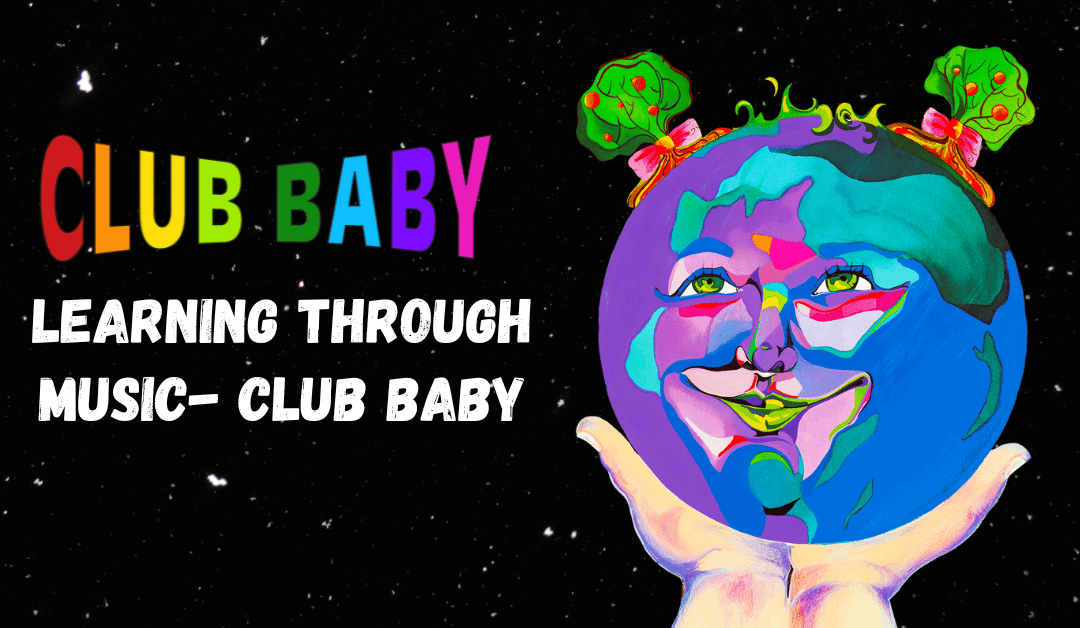
by admin | May 26, 2022 | Uncategorized
Music has been an integral part of human culture since the dawn of time. It is a powerful tool that can be used to teach children many important lessons and topics. From understanding emotions, expressing themselves creatively, developing rhythmic abilities, learning about different cultures and more – music offers a wealth of opportunities for kids to learn in fun and engaging ways.
In this blog post, we will discuss some of the most important topics for kids to learn through music.
What can you learn through music?
The first important topic that children can learn through music is rhythm. Having a strong sense of rhythm will help kids in many areas of life, from playing sports to even learning language and math skills. Learning how to keep a steady beat and mastering the ability to stay on track with different tempos and rhythms can help them develop important skills for other areas of life.
The second topic that kids can learn through music is self-expression. Music gives children the opportunity to express their feelings and emotions without having to use words. Through playing instruments, singing, or listening to different genres of music – children are given a voice that they can use to express themselves in a creative way.
Thirdly, music can also help kids to learn about different cultures. By listening to and performing different genres of music from around the world, children can gain an understanding of other cultures and their histories. This can be an incredibly powerful way for them to develop empathy and a greater appreciation for diversity in our society.
Art appreciation is another important topic for kids to learn through music. By exposing them to different forms of art – from classical music to contemporary styles, children can start to develop a deeper appreciation for art in general. This appreciation can help them better understand the world around them and become more appreciative of other cultures and lifestyles.
Music can teach kids about science and sustainability as well. Age appropriate lyrics can help children learn more about their environment. By teaching them about the importance of taking care of our planet, kids can gain a better understanding of sustainability and environmental impacts.
Finally, music is also a great way to teach children about their own emotions and how to cope with difficult situations. By using lyrics and melodies as tools, children can use music to process feelings such as anger, sadness, fear, and joy. This can be an incredibly powerful way to help them develop healthy coping skills for their future.
These are just a few of the important topics that kids can learn through music. Music is a powerful tool that can teach children so much about the world around them and help foster healthy development. By incorporating music into their lives, children can gain a greater understanding of the world in new and exciting ways.
There are countless other ways that music can help children develop important skills and knowledge. We encourage you to explore the different ways that music can have a positive influence on your child’s development.
If you are looking for more information about how to use music to help your kids learn, we recommend checking out our website for the most unique and educational nursery rhymes!
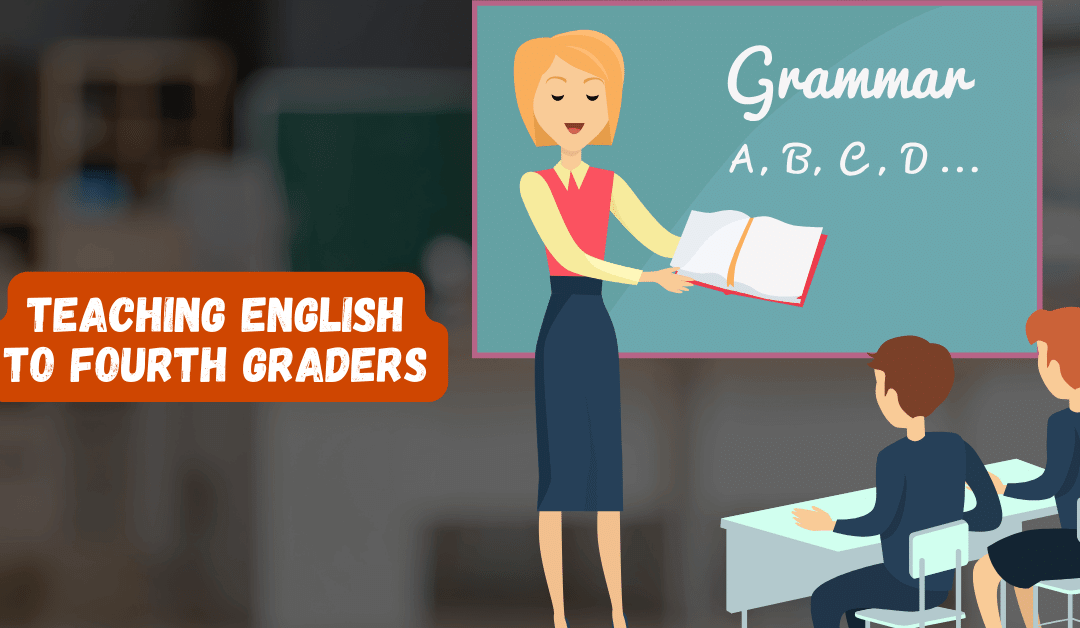
by admin | Apr 26, 2022 | Uncategorized
Teaching English to fourth graders can be a daunting task. On the one hand, they are old enough to understand complex concepts and have developed critical thinking skills. On the other hand, they may lack the focus and patience needed to learn a new language. Fortunately, there is an effective way of teaching English that incorporates nursery rhymes and music into the lesson plan: making learning fun!
- Incorporate nursery rhymes – Nursery rhymes are not only fun but also help students remember key concepts like pronunciation and grammar rules more easily due to their repetitive nature. Additionally, nursery rhymes often contain moral lessons which can help youngsters understand different aspects of language in a creative way;
- Use music – Music helps kids stay focused on their tasks while having fun at the same time; it can be used as background noise during class or incorporated into activities such as singing along with songs that illustrate certain topics;
- Utilize visual aids – Visual aids like flashcards, posters or videos can make learning more engaging for young learners who are naturally attracted by colorful images and animations;
- Break down complex ideas into smaller parts – Fourth graders may find it difficult to remember long strings of words so breaking down complex concepts into smaller parts can help them better retain the material;
- Encourage collaboration – Inviting students to work together on group activities not only helps them learn from each other, but also increases their confidence and motivation;
- Provide positive reinforcement – Positive reinforcement is key to keeping fourth graders motivated throughout the learning process. Rewarding their effort and progress with small rewards can make them feel encouraged to continue their studies.
By incorporating nursery rhymes, music, visual aids, breaking down complex ideas into smaller parts, and encouraging collaboration in the classroom, English teachers can make teaching fourth graders an enjoyable and fruitful experience. Furthermore, providing positive reinforcement will ensure that students remain motivated and engaged in their learning journey.
How Can Teachers Incorporate Music into Classrooms?
Music can be incorporated into the classroom in a variety of ways. For starters, teachers can use nursery rhymes and songs to introduce topics or review material with their students. Additionally, instrumental music without lyrics can be used as background noise during class to promote focus and relaxation. Teachers can also encourage students to create their own songs about specific concepts they are learning. This can help them remember the material better and have some fun at the same time! Finally, teachers can organize field trips to music-related events such as a concert or a musical performance where students can learn more about different artists and styles of music.
How Can Club Baby Help You Teach or Learn English?
At Club Baby, we understand the importance of providing children with easy and educational music that will help them learn and grow. Our website features a wide variety of songs that are perfect for children of all ages, from babies and toddlers to primary school students. We believe that providing children with positive and uplifting content is important, and we make sure that all our songs reflect this.
If you’re looking for a great resource to help your children learn and grow through music, look no further than Club Baby. Visit our website today and discover the wide variety of educational and entertaining songs that we have to offer. Sign up for our membership and have access to all our resources and features. Help your child learn and grow with Club Baby!
In conclusion, nursery rhymes and music are great tools for teaching English to fourth graders. Incorporating nursery rhymes, music, visual aids, breaking down complex ideas into smaller parts, and encouraging collaboration are all essential for making learning fun and effective. Moreover, providing positive reinforcement will ensure that students remain motivated and engaged in their studies. Using nursery rhymes and music in the classroom can make English teaching more enjoyable and rewarding.
Page 3 of 8«12345...»Last »




